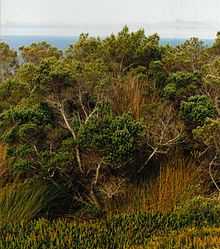Phylica arborea
From Wikipedia, the free encyclopedia
| Phylica arborea | |
|---|---|
 | |
| Scientific classification | |
| Kingdom: | Plantae |
| (unranked): | Angiosperms |
| (unranked): | Eudicots |
| (unranked): | Rosids |
| Order: | Rosales |
| Family: | Rhamnaceae |
| Genus: | Phylica |
| Species: | P. arborea |
| Binomial name | |
| Phylica arborea Thouars | |
| Synonyms | |
|
Phylica nitida | |
Phylica arborea, also known as the Island Cape Myrtle, is a shrub or small tree with narrow needle-like dark green leaves, downy silver on the underside, and with greenish white terminal flowers. Usually a shrub or procumbent tree, it may reach 6–7 m in height in sheltered locations. It is found on various isolated islands, including the Tristan da Cunha group and Gough Island, in the South Atlantic Ocean, as well as Amsterdam Island in the southern Indian Ocean.[1][2]
References
- ↑ World Wildlife Fund (Content Partner); Mark McGinley (Topic Editor). 2007. "Amsterdam and Saint-Paul Islands temperate grasslands." In: Encyclopedia of Earth. Eds. Cutler J. Cleveland (Washington, D.C.: Environmental Information Coalition, National Council for Science and the Environment). (Published in the Encyclopedia of Earth April 16, 2007; Retrieved January 19, 2009).
- ↑ San Marcos Growers: Phylica arborea - Island Cape Myrtle
External links
![]() Media related to Phylica arborea at Wikimedia Commons
Media related to Phylica arborea at Wikimedia Commons
This article is issued from Wikipedia. The text is available under the Creative Commons Attribution/Share Alike; additional terms may apply for the media files.